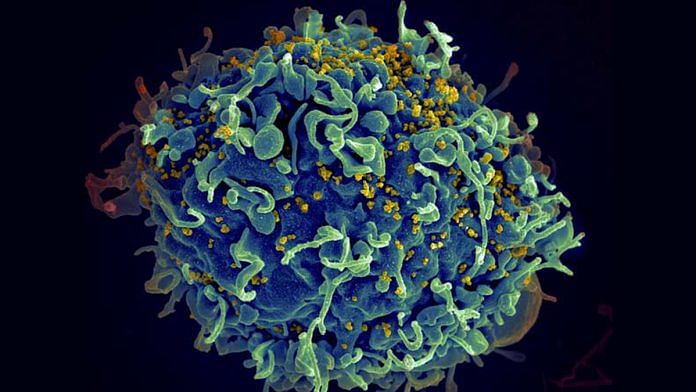Bengaluru: Moderna will begin human trials for its novel mRNA vaccine for HIV this week, following the highly successful production and rollout of the world’s first mRNA vaccine for Covid last year.
According to the trial protocol, the clinical trials conducted by the biotech company will begin Thursday in the US, and are scheduled to end on 1 May 2023.
The study will enroll 56 participants uninfected with HIV. They will be divided into four groups to test the combinations of two versions of the vaccine, called eOD-GT8 60mer mRNA Vaccine (mRNA-1644) and Core-g28v2 60mer mRNA Vaccine (mRNA-1644v2-Core).
The participants will receive the doses and will be monitored for adverse effects and signs of immune response after ten months or immunogenicity.
This is the first trial for an mRNA vaccine for HIV. After the success of mRNA vaccines with Covid-19, vaccines against HIV are thought to hold a lot of promise.
Also read: Moderna’s mRNA vaccine safe & effective in teens, US clinical trial findings show
How the vaccine works
The vaccine is expected to work similar to the Covid-19 vaccine — by getting the body’s cells to produce the HIV virus’s spike protein triggering an immune response.
In the preliminary Phase 1 results released earlier this year, the International AIDS Vaccine Initiative (IAVI) and Scripps Research announced that the candidate molecule used in this vaccine was able to produce the expected immune response by activating a group of cells called naive B cells.
These immune cells have not yet been activated as they have not been exposed to an antigen or foreign body before. The activation of these cells eventually resulted in the generation of strong proteins called broadly neutralising antibodies (bNAbs), which are known to neutralise the fast-mutating and highly diverse HIV virus.
Developing a vaccine using live, inactivated, attenuated, and viral vector vaccines over the past thirty years has proven to be a difficult challenge.
The ease of the mRNA technology allows it also to be tweaked easily for other potential new isolates or variants and new strains of the viruses.
Moderna is also working on another mRNA formulation for the HIV vaccine called mRNA-1574, as well as vaccines for multiple other diseases.
The study is sponsored by IAVI, and collaborators include the University of Texas at San Antonio, George Washington University, Fred Hutchinson Cancer Research Center, and Emory University, all in the US.
(Edited by Paramita Ghosh)
Also read: Delta variant the main culprit in India’s breakthrough Covid infections, study says



